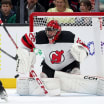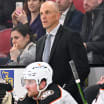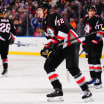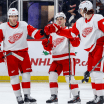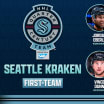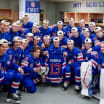In NHL.com's Q&A feature called "Sitting Down with …" we talk to key figures in the game, gaining insight into their lives on and off the ice. In this edition, we feature Arizona Coyotes general manager Bill Armstrong.
Armstrong talks status of Coyotes rebuild in Q&A with NHL.com
GM also discusses improved environment, similarities with Devils, ‘exciting’ rookie Cooley
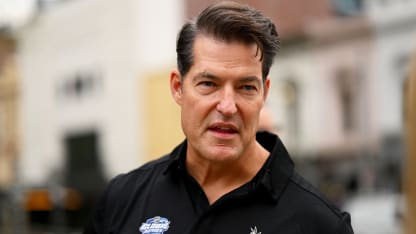
© Morgan Hancock/Getty Images
NEW YORK -- Bill Armstrong believes there are four stages to a successful rebuild.
"We're in Phase 2 right now," the Arizona Coyotes general manager said. "It's right on track."
The Coyotes are in their fourth season with Armstrong making the decisions and third with coach Andre Tourigny behind the bench.
They have won three of their first five games, including two straight. They visit the Los Angeles Kings at Crypto.com Arena on Tuesday (10:30 p.m. ET; SCRIPPS, BSW).
"We've stuck to the gameplan," Armstrong said. "This is exactly where I thought we'd be when I recruited coach. I said, 'You're going to have two years, it's not going to be pretty, but when you get into the third year, you're going to have some good young players to come and we'll put some veterans around them and here we go.' So, we're right where we're supposed to be."
Armstrong doesn't know when the Coyotes will be good enough to move into Phase 3 of the rebuild, but he's confident it will happen. He's already starting to see it.
"That's when your young players start to be good and you've got to make that step to make the playoffs," he said. "The fourth one is building that championship team and putting it on the ice. For us, it's just going in the phases."
Armstrong talked more about the Coyotes, where they were, how far they've come and how far they still have to go to get into Phase 3 and eventually Phase 4 in a recent Q&A with NHL.com.
When you got the GM job I'm sure there were some nightmares, some questions, but it was also a blank canvas. Do you feel like you're finally painting the picture now?
"It does, but what people don't understand before that was when I came in my presentation was about building a championship front office and sticking to that gameplan of realizing that behind the scenes you have to become a championship organization off the ice before you can become a championship organization. I think that comes from the fact that we had some really quality people from Martin Brodeur to Larry Robinson, Keith Tkachuk and Al MacInnis, smart minds around in St. Louis. That was one of the things I thought about, how do you make better decisions when you come through the door because it's all decision-making based when you're building the club from hiring coaches to strength trainers. So, we had a pretty good thought process coming through the door and we were able to go and build our structure one department at a time. The one we started with was the amateur scouts, the most important one at that particular moment in the rebuild. We knew we were going to draft so we needed to build really good scouts. From there it was coaching and the next step was development staff, strength training, sports science, analytics departments. It's a big organization behind the scenes and that has to be the best of the best before you can become the best on the ice."
What are you most proud of to date about this rebuild?
"Probably when I go to the rink right now and I see the guys take the ice and they play with spirit. They're excited about being a Coyote. They want to be here. That's what I'm most proud about because I think when I came in here nobody wanted to be here. That was frightening for me at the same time because everybody wanted out. Now you see the guys that are playing with that fire. Not everybody wanted out, but I'd say the majority, and now you see the guys wanting to build here, wanting to take the next step in the right direction."
Do you get a feel from people around the NHL that there is a growing level of respect for the Coyotes and the type of team they are?
"You have to earn it every night you go on the ice. That's the NHL, right? But I think people don't know how good we can be and we don't know how good we can be. There's a scary factor there where people are like, 'OK, how good are these guys, and are they going to continue to be good or is it just a flash at the start of the year?' For us, we don't know that answer either and that's the exciting part. It really is what the players are willing to give every night. We do have the skill, we've got speed, goaltending. We've got all the pieces and now it just has to come together and how hard can they play every night. So, I think the respect is there and there's a scariness about us that people are not sure how good we actually are."
Wasn't that the Devils last year?
"Yes. Yes. But they were probably a little bit ahead of us because they had gone out and gotten the Dougie Hamiltons of the world. They had taken a bigger step than we have, but nobody knew about them last year and that was scary and that's the same with us. It's fair to say it's roughly the same."
Is Clayton Keller captain material?
"I think all our guys that wear the 'A' are. I think the way that 'Bear' has done it is he's put it in a sense that you're all leaders, you're the leadership group so let's go from here. I think it's unique. People say, 'Where's your captain?' Well, do we have to have one? Is there a written rule that we have to have one? Everybody knows how the actual leader is behind the scenes. The players know that. But I don't know if you necessarily have to have a captain to win it. They've done a nice job with that group. We're the new wave NHL team where we'll be hiring people in the summer and our leadership group will be meeting with people and approving. There's a little bit of a way that we do business to include the leaders in some of the decision-making process. If we have somebody who is going to come in and be around the players and work with them, they have that right to go in and meet them and give us their opinion. I think that's an important part to being in Arizona. I think that's an important part to the way that our culture is and the way you get the player vested into our team. They've got to be happy, right. You have to have a great environment for your players."
You were able to get some veteran free agents to buy in this offseason and sign with the Coyotes. Do you view that as a big part of reaching Phase 2 and eventually graduating to Phase 3 of the rebuild?
"It was a great summer for us. Our players that have left and gone on to play for other teams are our greatest recruiting tool because we can say go call this particular player and get them to give you honest feedback of what it's like, what the environment is like, what the coaching is like and what it's like to live in Arizona. And I believe that if we can land a rink, we can be an elite organization in the NHL. The reason I believe that is Arizona is the No. 1 ranked place to live for wives in the NHL, and wives have a huge impact on where the free agent goes. So that's one. Two, you've got great taxes. It's a small issue but it adds in. And three, we have a situation where you leave the plane and you're home in 10 minutes, and there's no traffic. And you've got sunshine almost every day in the winter. So, the quality of living for us is at a different level than most places in the NHL. What we also have behind the scenes is the sports science, analytics, skills development that we're heavily invested in and extra skill coaches for the players. The way that we practice is different in how we produce extra repetitions of skillwork. For us we've put a lot of money into ways we can make players better. It's nutrition. It's educating the player on sleep. It's all these little things we do behind the scenes. There's a reason a lot of our players came back to us and there's a reason we had success in free agency when we were recruiting. What we don't have is a 19,000-seat arena, but what we do have is when we practice we've got three sheets of ice and that's a gamechanger for us when we run practice."
And maybe the 19,000-seat arena could be coming?
"Well, I believe it is. I believe it is."
Your job is to run the hockey team, put the team together and put a winner on the ice, but are you involved in the arena conversations at all?
"I get updates here and there and try to stay involved when I can. I have my thought process of how it should be built out for the training center and the rinks and dressing rooms. I try to give my input in that way, but ultimately it really comes down to your ownership and the NHL and pretty much the state of Arizona."
You signed an extension this summer. Andre Tourigny signed one too. So did the assistants. It seems like the stability is greater than I can ever remember it being with the Arizona Coyotes. How essential is that to what you're doing now?
"The players are reading that too and it is stability. From being around the scouting world and seeing changeover after changeover go through teams sometimes you see that there were good people in organizations, but they had to wait around and wait around and spend all their energy worrying about their job instead of trying to do their job better. That's what we tried to do in the summer, take that process and make sure we added stability and make sure people were concerned with doing their job better."
Everyone wants to talk about Logan Cooley. He's skilled. He's young. He's raw. But are you seeing a young player playing on instinct now, doing what he would be doing in college only now in the NHL?
"He's a pretty exciting player for us. Every time you add a player that is young and he's got a vibrant personality and he wants to get better, that's exciting for the organization. I think that inspires even the Clayton Kellers of the world. People get excited about going on the ice and seeing what he can do. I mean, he can bring you out of your seat when you're watching him. That's exciting for us. The one thing we love also about Logan is he's also working to get better at defense and he's working to play the right way. Our thought process is to raise him right and that's teaching him everything from cooking to living properly off the ice and playing the right way so he can be our best player but at the same time he can give us a chance to win a championship."
Think about all the things you have talked about in this interview; analytics, sports science, development and now cooking. Did you ever think you'd be talking to a player about cooking?
"Ha. Yeah, but it's raising your organization properly. I think you have to teach and you have to plant seeds and you have to have high expectations. Nowadays the players want that too. They want to get better. It's all about an environment for the player to get better, an environment where they can perfect themselves, whether that's with skills, showing them video connected with analytics, mental health, eating better and showing them nutrition through their body. Players want this. We try to provide that for them and I think it's paid dividends for us."
